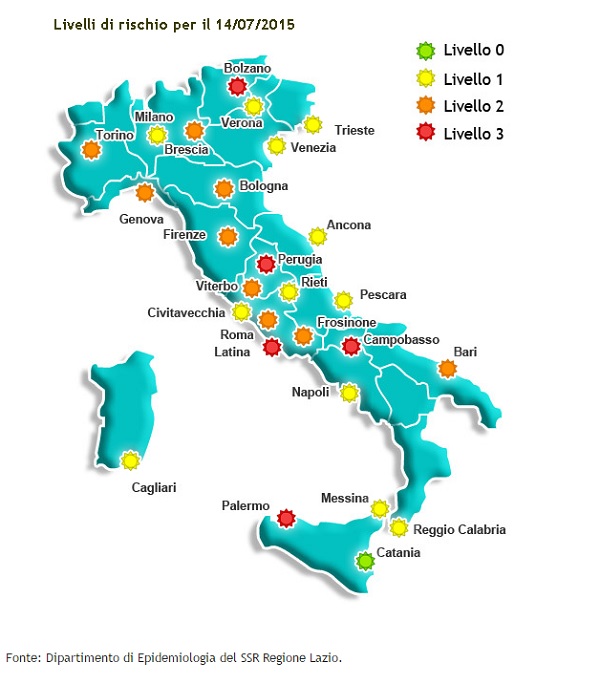Eating and drinking correctly can help cope with the heat and reduce the health risks of heat waves, especially dehydration. ten valuable tips for a correct and safe diet in the summer from the ministry of health
Don't store avocado like this: it's dangerous
Watch out for heat waves, how to fight them starting from the table? What and how to eat in hot weather? For the next 3 days, temperatures and humidity are expected to rise in most cities, particularly in the center-north, associated with level 2 and 3 risk conditions. Today, Tuesday 14 July level 2 and 3 in 14 cities (Bolzano, Turin, Brescia, Genoa, Bologna, Florence, Perugia, Viterbo, Rome, Frosinone, Latina, Campobasso, Bari and Palermo).
For Thursday it will be even worse: risk conditions of level 2 and 3 in 23 cities (Bolzano, Turin, Milan, Brescia, Verona, Trieste, Genoa, Bologna, Florence, Perugia, Viterbo, Rieti, Civitavecchia, Rome, Frosinone, Latina, Pescara, Ancona, Naples, Campobasso, Bari, Messina and Palermo) with values of maximum apparent temperature between 35-39 ° C.
To deal with the hot emergency, the Ministry of Health has activated the public utility number 1500 "Safe summer, how to beat the heat". The service is free and active every day from 9.00 to 18.00, including Saturdays and Sundays. More than 1300 citizens have contacted number 150, mainly elderly people with chronic diseases (diabetes, hypertension, heart disease, chronic bronchitis, allergic asthma), who claim to be alone.

For this reason, the Ministry of Health has drawn up ten precious tips for a correct and safe diet in summer, a period accompanied by more free time, with different eating habits compared to the rest of the year: greater number of meals outside the home, little attention to intake. nutritional, less formalities.
Drinking and eating properly contributes to cope with the heat and reduce health risks due to heat waves, especially dehydration. When it is very hot, children, pregnant women and the elderly can suffer more and be more at risk of dehydration.
Index
1) Drink at least two liters (eight glasses) of water per day
In summer, minerals are lost with increased sweating and perspiration. For the elderly, it is particularly important to drink, regardless of the stimulus of thirst. Children need to drink more. Moderate the consumption of drinks with added sugars. Limit the consumption of moderately alcoholic beverages such as wine and beer. Avoid drinks that are high in alcohol.
Read: 10 FRUIT FLAVORED WATER RECIPES
2) Respect the number and times of meals on a daily basis
especially breakfast, which must be privileged over other meals. Breakfast is the most important meal of the day, it comes after the longest fasting period in the space of 24 hours and provides the "fuel" for the whole day. Not consuming an adequate breakfast also predisposes to a greater intake of calories in the following hours.
3) Increase the consumption of seasonal fruit and vegetables and yogurt
Eat fresh seasonal fruits and vegetables (at least 400g per day, WHO). Prefer yogurt with no added sugar. Together with fruit, it can become an excellent snack. Do not neglect dried fruit (almonds, walnuts, etc.), rich in "good" fats, minerals and fibers, but do not overdo it, because it brings calories.
4) Prepare the dishes with imagination, varying the food even in the colors
The color of the food is given by the substances with antioxidant action (vitamins, polyphenols, etc.): the more the colors are varied, the more complete their intake.
Read: Fruits and vegetables: here are the 10 foods that make you tan the most
5) Moderate the consumption of elaborate and high-fat dishes
With heat, the body consumes less energy. It is therefore advisable to moderate the caloric intake, preferring a cooking able to maintain the supply of minerals and vitamins unchanged, also decreasing the amount of salt to add during preparation. Season with raw olive oil.
6) Give preference to fresh foods, easily digestible and rich in water and complete the meal with fruit
This rule must be followed in particular when eating a "packed" lunch, not exaggerating with salty or sugary snacks.
7) Eat an ice cream or smoothie
It can be an alternative to the mid-day meal. The ice cream or milk shake that replaces the meal must be included in the daily nutritional intake.
8) Avoid complete meals with first, second and side dishes
When, while staying in a hotel or traveling, it is easier to eat both lunch and dinner at the restaurant. Opt for one of two occasions for balanced single dishes that can provide the nutrients of an entire meal. Some of the possible combinations are pasta with legumes and / or vegetables, meat / fish / eggs with vegetables.
9) Consume a little salt and prefer iodized salt
La iodine deficiency it is still a problem: the thyroid affects many functions of the organism and needs the right daily income, guaranteed by the consumption of only 5 g of iodized salt. For hypertensive people it may be useful to consume low-sodium or asodic salt.
10) Respect the methods of storing food
Maintain the cold chain for foods that require it (thermal bag for picnics). Remember that foods stored for a long time in the refrigerator risk nutritional deterioration and / or contamination by microorganisms.
Read: How to best store fruit and vegetables in the summer
Roberta Ragni
Read also:
10 GOLDEN RULES TO FIGHT AFA AND HEAT STRIKES
HOT AND AFA: WHAT TO MAKE CHILDREN EAT IN SUMMER. THE ADVICE OF PEDIATRICIANS
AFA: THE 10 BEST DRINKS TO RELIEVE THIRST AND REHYDRATE THE BODY
10 FOODS AND DRINKS TO PREPARE AT HOME TO REFRESH


























